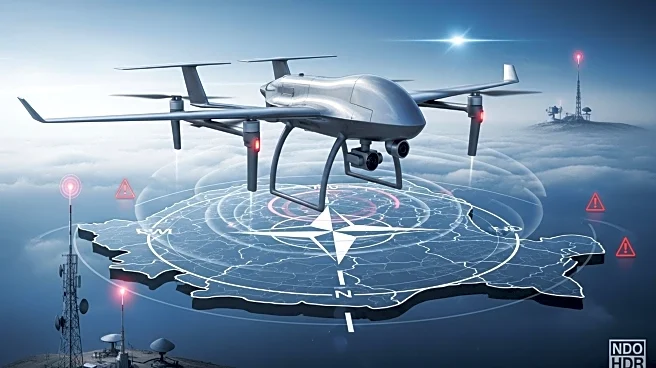What's Happening?
A Russian drone breached Romanian airspace during an attack on Ukraine, marking the second incursion into NATO airspace this week. Romania, which shares a 400-mile border with Ukraine, responded by scrambling two fighter jets and issuing warnings to residents in the southeastern region to take cover. The drone, which did not fly over inhabited areas, penetrated six miles into Romanian territory and remained in NATO airspace for approximately 50 minutes. Ukrainian President Volodymyr Zelensky described the incident as an 'obvious expansion of the war' by Russia, suggesting that the drone's route was deliberately calculated by the Russian military. This event follows a similar incursion into Polish airspace earlier in the week, which was described by Polish Prime Minister Donald Tusk as an 'unprecedented' threat.
Why It's Important?
The breach of Romanian airspace by a Russian drone is significant as it represents a direct challenge to NATO's territorial integrity and could escalate tensions between Russia and the Western alliance. Such incursions test the resolve and response capabilities of NATO member states, potentially leading to increased military readiness and heightened diplomatic tensions. The incident underscores the broader geopolitical stakes of the Russia-Ukraine conflict, with potential implications for regional security and international relations. The actions by Russia may be seen as attempts to probe NATO's defenses and gauge the alliance's response to provocations, which could influence future military and diplomatic strategies.
What's Next?
In response to these incursions, NATO member states may consider bolstering their air defense systems and increasing surveillance along their borders with Russia. Diplomatic efforts to address these provocations are likely to intensify, with potential discussions on reinforcing NATO's collective defense commitments. The situation may also prompt further military exercises and readiness drills among NATO allies to deter future incursions. Additionally, there could be calls for increased sanctions or other punitive measures against Russia to discourage further aggressive actions.
Beyond the Headlines
The repeated breaches of NATO airspace by Russian drones highlight the evolving nature of modern warfare, where unmanned aerial vehicles play a significant role in reconnaissance and strategic operations. This development raises questions about the adequacy of current air defense systems and the need for technological advancements to counter drone threats. Furthermore, the incidents may influence public opinion in NATO countries, potentially leading to increased support for defense spending and military preparedness.









